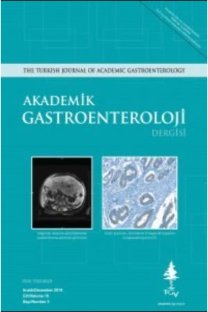Frequency evaluation of gastrointestinal symptoms and liver test disorder in patients during the Covid-19 outbreak in the military unit: A single-center pilot study
Askeri birlikte Covid-19 salgını sırasında hastalarda gastrointestinal semptomların ve karaciğer test bozukluğu sıklığının değerlendirilmesi: Tek merkezli pilot çalışma
___
1. Richman DD, Whitley RJ, Hayden FG, eds. Clinical virology, 4th edn. Washington: ASM Press, 2016.2. Ksiazek TG, Erdman D, Goldsmith CS, et al; SARS Working Group. A novel coronavirus associated with severe acute respiratory syndrome. N Engl J Med 2003;348:1953-66.
3. de Groot RJ, Baker SC, Baric RS, et al. Middle East respiratory syndrome coronavirus (MERS-CoV): announcement of the Coronavirus Study Group. J Virol 2013;87:7790-2.
4. Wang L, Wang Y, Ye D, Liu Q. Review of the 2019 novel coronavirus (SARS-CoV-2) based on current evidence. Int J Antimicrob Agents 2020;55:105948.
5. Chen N, Zhou M, Dong X, et al. Epidemiological and clinical characteristics of 99 cases of 2019 novel coronavirus pneumonia in Wuhan, China: a descriptive study. Lancet 2020;395:507-13.
6. Huang C, Wang Y, Li X, et al. Clinical features of patients infected with 2019 novel coronavirus in Wuhan, China. Lancet 2020;395:497-506.
7. Liu Y, Gayle AA, Wilder-Smith A, Rocklöv J. The reproductive number of COVID−19 is higher compared to SARS coronavirus. J Travel Med 2020 [Epub ahead of print]. doi:10.1093/jtm/taaa021).
8. Xiao F, Tang M, Zheng X, et al. Evidence for gastrointestinal infection of SARS-CoV-2. Gastroenterology 2020. [Epub ahead of print March 3, 2020.]
9. Gu J, Han B, Wang J. COVID-19: Gastrointestinal manifestations and potential fecal-oral transmission. Gastroenterology 2020. [Epub ahead of print March3, 2020.]
10. Pan L, Mu M, Yang P, et al. Clinical characteristics of COVID-19 patients with digestive symptoms in Hubei, China: A descriptive, cross-sectional, multicenter study. Am J Gastroenterol 2020;115:766-73.
11. Holshue ML, DeBolt C, Lindquist S et al; Washington State 2019- nCoV Case Investigation Team. First case of 2019 novel coronavirus in the United States. N Engl J Med 2020;382:929-36.
12. Wang H, Qui P, Liu J, Wang F, Zhao Q. The liver injury and gastrintestinal symptoms in patients coronavirus disease 19: A systematic rewiev and metanalysis. Clin Res Hepatol Gastroenterol 2020. Epub 2020 May 12.
13. Yang X, Yu Y, Xu J et al. Clinical course and outcomes of criticallyill patients with SARS-CoV-2 pneumonia in Wuhan, China: a single-centered, retrospective, observational study. Lancet Respir Med 2020. Epub 2020 Feb 24.
14. Xu XW, Wu XX, Jiang XG et al. Clinical findings in a group ofpatients infected with the 2019 novel coronavirus (SARS-Cov-2) outside of Wuhan, China: retrospective case series. BMJ 2020;368:m606.
15. Opal SM, Girard TD, Ely EW. The immun patogenesis of sepsis in elderly patients. Clin Infect Dis 2005; 41(Suppl 7):S504-12.
16. Leung WK, To KF, Chan PK, et al. Enteric involvement of severe acute respiratory syndrome associated coronavirus infection. Gastroenterology 2003;125:1011-7.
17. Lee N, Hui D, Wu A, et al. A major outbreak of severe acute respiratory syndrome in Hong Kong. N Engl J Med 2003;348:1986-94.
18. Chan JF, Lau SK, Tos K, et al. Middle East respiratory syndrome coronavirus: another zoonotic beta coronavirus causing SARS-like disease. Clin Microbiol Rev 2015;28:465-522.
19. Zhang H, Kang ZJ, Gong HY, et al. The digestive system is a potential route of 2019-nCov infection: a bioinformatics analysis based on single-cell transcriptomes. Preprint. Posted online January 30, 2020. bioRxiv 927806.
20. Liang W, Feng Z, Rao S, et al. Diarrhoea may be underestimated: a missing link in 2019 novel coronavirus. Gut 2020, Epub 2020 Feb 26.
21. Han C, Duan C, Zhang S, et al. Digestive Symptoms in COVID-19 Patients With Mild Disease Severity: Clinical Presentation, Stool Viral RNA Testing, and Outcomes. Am J Gastroenterol 2020;115:916- 23.
22. Jin X, Lian JS, Hu JH, et al. Epidemiological, clinical and virological characteristics of 74 cases of coronavirus-infected disease 2019 (COVID-19) with gastrointestinal symptoms. Gut 2020;69:1002-9. Epub 2020 Mar 24.
23. Chai X, Hu L, Zhang Y, et al. Specific ACE2 expression in cholangiocytes may cause liver damage after 2019-nCoV infection. bioRxiv 2020; published online Feb 4.
24. Banales JM, Huebert RC, Karlsen T, et al. Cholangiocyte pathobiology. Nat Rev Gastroenterol Hepatol 2019;16:269-81.
- ISSN: 1303-6629
- Yayın Aralığı: Yılda 3 Sayı
- Başlangıç: 2002
- Yayıncı: Jülide Gülay Özler
Gökhan KÖKER, Seyit UYAR, Gülhan ÖZÇELİK KÖKER, Mehmet Mutlu ÇATLI, Yasin ŞAHİNTÜRK, Feyzi BOSTAN, Ayhan Hilmi ÇEKİN
Kolonda nadir bir darlık ve ülser nedeni: Kronik graft versus host hastalığı
Fatma Zeynep ÖZEN, Orhan COŞKUN, Mustafa ÇAPRAZ, Deniz YILMAZ
İbrahim Hakkı KÖKER, Nurhan ŞAHİN
Enver AVCI, Onur AKHAN, Erkin ÖZTAŞ, Selçuk DİŞİBEYAZ
Otoimmün hepatit tanılı hastada azatioprin tedavisi sonrası gelişen Kaposi sarkomu
Tuğçe TOPOĞLU ÇAĞLAR, Azar ABİYEV, Özlem ERDEM, Murat KEKİLLİ, İbrahim DOĞAN
Yiğit Mehmet ÖZGÜN, Volkan ÖTER, Erol PİŞKİN, Muhammet Kadri ÇOLAKOĞLU, Osman AYDIN, Erdal BOSTANCI
Helicobacter pylori ve inflamatuvar bağırsak hastalığı arasındaki ilişki
Emre GERÇEKER, Serkan CERRAH, Ahmed Ramiz BAYKAN
A rare cause of stricture and ulcer in the colon: Chronic graft versus host disease
Orhan COŞKUN, Deniz YILMAZ, FATMA ZEYNEP ÖZEN, Mustafa ÇAPRAZ
COVID 19 hastalarında karaciğer fonksiyon bozukluğu ve prognoz ile ilişkisi
Harun ERDAL, Ayfer BAKIR, Ümit SAVAŞÇI, Tunahan AYAZ, Hilal Ebru İŞİKAN, Mine FİLİZ, Yakup ARSLAN, Gonca FİDAN, Umut KARA, Gülden YILMAZ, Deniz DOGAN, Bilgin Bahadır BAŞGÖZ, Gürhan TAŞKIN, Serkan SENKAL, Cantürk TAŞÇI, Levent YAMANEL, Ahmet UYGUN, Mustafa GÜLŞEN
Yaşlılarda kandida özofajiti: Tek merkez deneyimi
Ferit ÇELİK, Alper UYSAL, Ali ŞENKAYA, NALAN GÜLŞEN ÜNAL, İ lkçe Akgün KURTULMUŞ, Fatih TEKİN, Ahmet Ömer ÖZÜTEMİZ
